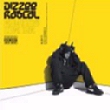|
|

Dizzee Rascal In his essential book on the cultural history of dance music, Energy Flash, Simon Reynolds posits a theory about the way truly innovative electronic music has been classified. It's a theory I admire for its iconoclasm and wilfulness than any real impact it's had on my listening, but Reynolds legitimately claims that so-called progressive artists are really the conservative ones, that they become critical darlings merely because those critics are able to understand their music within the context of received norms like jazz or funk. The prime example is of jungle: the original sounds of dark bass and thunderous breakbeats grew out of rave and hardcore, but the label seemed to attain its cultural art form status only as it morphed into "intelligent drum 'n' bass", with its latent danger largely sidelined in favour of chin-stroking jazzy motifs. One look at the relative labels for these two types of music and you see the potential implications. Jungle vs intelligent; primitive vs educated; black vs white - the delineation is outmoded and offensive, and one that of all genres dance music should be above. So, where does all this precedent place the critical, prestigious Mercury Award-winning success of Dizzee Rascal's debut, Boy In Da Corner? The victory last month certainly surprised a few people. This is the sort of music that normally takes years to sink in, to seep into the mainstream before its influence shows it up to have been ahead of its time. Maybe the judges were relieved to find a less objectionable version of the urban music pedalled by the So Solid Crew, or maybe they felt they could assuage a little bit of white liberal guilt by rewarding an 18 year old black kid from East London. Or maybe they just chose yet another debut album as this year's recipient as debuts so often feel like the grand musical gesture, the announcement of a distinct identity as much as a collection of songs. Either way, this is a startling record; one whose immediacy is matched by a feeling that it will continue to reveal new depths long after the hubbub over Dizzee himself has died! Dylan Mills is a product of East London's Langdon Park school, the largest in the country with 2000 pupils and ridiculously unmanageable class sizes to match. Excluded from almost all lessons but music, Mills starting using Cubase and learned how to realise the music he heard in his head. It's obviously not a place you'd want to be for any period of time, given the predominance here of digital bleeps, chest-quaking bass, whooping sirens and twitchy, tetchy beats. Ominous and in your face, hollow synths and ragga rhythms combine to make it clear why those looking for the new 'sound of the streets' feel compelled to herald Dizzee's arrival. Making The Streets' Original Pirate Material sound like a walk in the park, Dizzee has concocted a truly urban onomatopoeia. Tracks like "Wot U On?"," Round We Go" and "Hold Ya Mouf" hit home with a unique British sense of sonic invention. The unpredictable bounce of "Sittin' Here" and "Seems 2 Be" sounds threatening, but there's always compelling reason to stick with it. You do end up rapt at the assault on your ears, a sucker for your own destruction. The album is at its most accessible on the single, "Fix Up Look Sharp", wherein what sounds like an old Def Jam break powers through a Billy Squire sample catchy enough to wrong-foot anyone buying Boy In Da Corner on the strength of this one track. The only thing to nearly match it for pop sensibility is "Jus' A Rascal", where a chorus chants the title in a way that sounds half frantic, half hysterical. Just like the way Dizzee sounds all the time. And it's this MC style that is often the most startling element to this album. Where most rappers are content to lecture, boast or just flow, Dizzee sounds like he's drowning in the urban/sonic miasma around him. Barely holding on to his emotions, he resembles a rabbit in the headlights, but one determined to make himself heard before he gets mown down. With astonishing maturity for his age, he tackles teenage pregnancy and casual sex, drug use and the sickeningly narrow life opportunities offered to him and his peers. The title Boy In Da Corner may well refer to the way he felt about sitting in class at school, but it pretty much sums up the view someone like Dizzee has of the life set out in front of him. Before the critical powers that be start congratulating themselves too much, it's worth noting that the lad's massive achievement was to get noticed at all. By the time the awards and broadsheet articles dry up, how many potential Dizzee Rascals will we have let slip through our fingers? Copyright © 2003 James Caig
|
| © 2011 Luna Kafé |